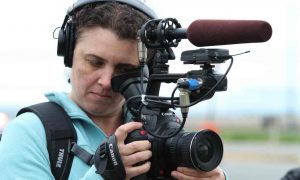At last year’s University Film and Video Association annual conference, filmmaker and Portland State University professor Courtney Hermann spoke about her own work in relation to CMSI’s Dangerous Documentaries: How to Lower Risk when Telling Truth to Power report. Recently, she found herself in another dangerous situation, one with alarming implications for all filmmakers on front lines. Her report:
“Like several other journalists and documentary filmmakers covering front line climate change activism in recent weeks, Lindsey Grayzel of Portland, OR and her camera operator are being charged with a number of crimes for covering an action. In this case, the action was done by activist Ken Ward, who shut down a tar sands oil pipeline in Anacortes, WA last week along with two others who did the same in other places, in solidarity with the No DAPL movement.

Activist Ken Ward in Grayzel’s documentary “The Reluctant Radical.”
I’m especially moved to share this with you because I was asked to be Grayzel’s camera operator that day, but I could not do it because I had to be on another job. I am rattled not just by the arrest of my colleague and her camera operator, but by the set of charges they both face, which are identical to that of their subject Ken Ward, and carry a potential sentence of 30+ years in prison.
Grayzel and her camera operator did not break into the facility where the oil pipeline works are housed. They did not trespass. They were standing outside of a fence video recording Ward’s action. And yet, they were charged with the exact same charges that Ward faces.
These charges are:
• Burglary
• Criminal Tresspass
• Sabotage
• Assemblage of Sabateurs
Yesterday, my partner and I recorded video of Ward before, during, and after his arraignment in Skagit County Washington Superior Court. The prosecutors on the case did NOT want us to shoot the proceedings and called into question whether or not we were legitimate media. They gave us the run around–even though it is typically not a problem to record video in Skagit County Washington courtrooms. Their reluctance to let us shoot created some confusion among court administrators, who ultimately furnished me with the paperwork we needed to present to the judge to get in, and were apologetic about the obstacles that were put in our way.
Our presence there was discussed in a brief, tense exchange between the prosecutors, Ward’s attorney, and the judge. I got the distinct impression that the prosecutors were acting out the position they are taking in Grayzel’s case–that independent media makers are not legitimate journalists like the local news station is and therefore cannot claim the same privileges. In fact, a local news station did arrive later in the day to cover Lindsey Grayzel’s arraignment. In the story linked to below that this station put together, the reporter says the prosecutors said that comparing Grayzel and her camera operator to their local news station was “comparing apples and oranges”.

Lindsey Grayzel. Photograph: Ben Grayzel.
In other words, it appears to me that there is a desire to suppress coverage of newsworthy events by those who may tell a more nuanced story about those events than, say, a local news station would. Here is the link to the local news coverage.
Docs are even more dangerous than ever and we owe it to our students not to promote our isolation and under-resourced position as documentary filmmakers to students and to each other as a badge of courage. Instead, let’s formalize our practices and disseminate information about these practices the way that journalists have done forever—a goal that can be achieved without sacrificing creative self-expression. We are more protected when we agree on best practices and follow them.”
Courtney Hermann’s conclusion echoes that of the report, which contains a resource guide to some best practices developed both by documentarians and journalists. The report has ignited a conversation, including one at DOCNYC on Nov. 15, featuring Center co-director Caty Borum Chattoo. As well, BritDoc announced at the International Documentary Association’s Getting Real conference a new initiative, working with filmmakers, journalists, safety trainers, insurers and other experts to develop common risk assessment and planning tools, doc specific training and other partnerships to do more of what Hermann is calling for. Look for that, but don’t stop organizing, and supporting filmmakers who are putting their work and lives on the line.
